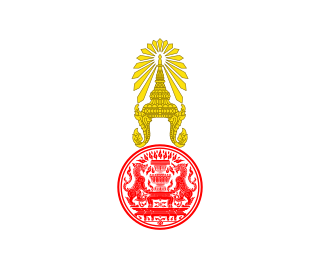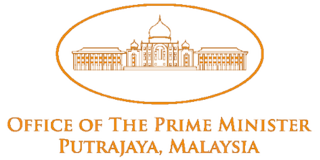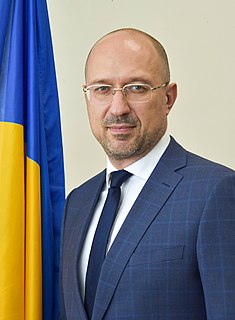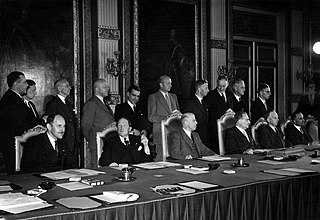
The prime minister of Japan is the head of government of Japan. The prime minister chairs the Cabinet of Japan and has the ability to select and dismiss its Ministers of State. The prime minister also serves as the civilian commander-in-chief of the Japan Self Defence Forces and as a sitting member of the House of Representatives. The individual is appointed by the emperor of Japan after being nominated by the National Diet and must retain the nomination of the lower house and answer to parliament to remain in office.

The prime minister of Israel is the head of government and chief executive of the State of Israel.

The prime minister of Finland is the leader of the Finnish Government. The prime minister and their cabinet exercise executive authority in the state. The prime minister is formally ranked third in the protocol after the president of Finland and the speaker of the Parliament. Finland's first prime minister, Pehr Evind Svinhufvud, was appointed on 27 November 1917, just a few days before the country declared independence from Russia.

The prime minister of Thailand is the head of government of Thailand. The prime minister is also the chair of the Cabinet of Thailand. The post has existed since the Revolution of 1932, when the country became a constitutional monarchy.Prior to the coup d'état, the prime minister was nominated by a vote in the Thai House of Representatives by a simple majority, and is then appointed and sworn-in by the king of Thailand. The house's selection is usually based on the fact that either the prime minister is the leader of the largest political party in the lower house or the leader of the largest coalition of parties. In accordance with the 2017 Constitution, the Prime Minister can hold the office for no longer than eight years, consecutively or not. The post of Prime Minister is currently held by retired general Prayut Chan-o-cha, since the 2014 coup d'état.
Parliamentary opposition is a form of political opposition to a designated government, particularly in a Westminster-based parliamentary system. This article uses the term government as it is used in Parliamentary systems, i.e. meaning the administration or the cabinet rather than the state. In some countries the title of "Official Opposition" is conferred upon the largest political party sitting in opposition in the legislature, with said party's leader being accorded the title "Leader of the Opposition".

The prime minister of Croatia, officially the President of the Government of the Republic of Croatia, is Croatia's head of government, and is de facto the most powerful and influential state officeholder in the Croatian system of government. Following the first-time establishment of the office in 1945, the 1990–2000 semi-presidential period is the only exception where the president of Croatia held de facto executive authority. In the formal Croatian order of precedence, however, the position of prime minister is the third highest state office, after the president of the Republic and the speaker of the Parliament.

The Prime Minister of Malaysia is the head of government of Malaysia. The prime minister directs the executive branch of the federal government. The Yang di-Pertuan Agong appoints as the prime minister a member of Parliament (MP) who, in his opinion, is most likely to command the confidence of a majority of MPs; this person is usually the leader of the party winning the most seats in a general election.

The Parliament of Malaysia is the national legislature of Malaysia, based on the Westminster system. The bicameral parliament consists of the Dewan Rakyat and the Dewan Negara. The Yang di-Pertuan Agong (King), as the head of state, is the third component of Parliament.

The Dewan Rakyat is the lower house of the bicameral Parliament, the federal legislature of Malaysia. The chamber and its powers are established by Article 44 of the Constitution of Malaysia. The Dewan Rakyat sits in the Houses of Parliament in Kuala Lumpur, along with the Dewan Negara, the upper house.

The Attorney-General for Australia is the First Law Officer of the Crown in right of the Commonwealth of Australia, chief law officer of the Commonwealth of Australia and a minister of state. The attorney-general is usually a member of the Federal Cabinet, but need not be. Under the Constitution, they are appointed by the Governor-General on the advice of the Prime Minister, and serve at the Governor-General's pleasure. In practice, the attorney-general is a party politician and their tenure is determined by political factors. By convention, but not constitutional requirement, the attorney-general is a lawyer by training.

The cabinet of the Netherlands is the main executive body of the Netherlands. The current cabinet of the Netherlands is the Fourth Rutte cabinet, which has been in power since 10 January 2022. It is headed by Prime Minister Mark Rutte and his deputies Sigrid Kaag, Wopke Hoekstra and Carola Schouten.

The prime minister of Ukraine is the head of government of Ukraine. The prime minister presides over the Cabinet of Ministers of Ukraine, which is the highest body of the executive branch of the Ukrainian government. The position replaced the Soviet post of chairman of the Council of Ministers of the Ukrainian SSR, which was established on March 25, 1946.

The Federal Cabinet or Federal Government is the chief executive body of the Federal Republic of Germany. It consists of the Federal Chancellor and cabinet ministers. The fundamentals of the cabinet's organisation as well as the method of its election and appointment as well as the procedure for its dismissal are set down in articles 62 through 69 of the Basic Law for the Federal Republic of Germany (Grundgesetz).
The Cabinet of Ministers of Ukraine, commonly referred to as the Government of Ukraine, is the highest body of state executive power in Ukraine. As Cabinet of Ministers of the Ukrainian SSR, it was formed on 18 April 1991, by the Law of Ukrainian SSR No.980-XII. Vitold Fokin was approved as the first Prime Minister of Ukraine.

The chancellor of Germany, officially the federal chancellor of the Federal Republic of Germany, is the head of the federal government of Germany and the commander in chief of the German Armed Forces during wartime. The chancellor is the chief executive of the Federal Cabinet and heads the executive branch. The chancellor is elected by the Bundestag on the proposal of the federal president and without debate.
The Government of the Republic of Slovenia exercises executive authority in Slovenia pursuant to the Constitution and the laws of Slovenia. It is also the highest administrative authority in Slovenia.

The Second Drees cabinet, also called the Third Drees cabinet was the executive branch of the Dutch Government from 2 September 1952 until 13 October 1956. The cabinet was formed by the social-democratic Labour Party (PvdA) and the christian-democratic Catholic People's Party (KVP), Anti-Revolutionary Party (ARP) and Christian Historical Union (CHU) after the election of 1952. The cabinet was a centrist grand coalition and had a majority in the House of Representatives with Labour Leader Willem Drees serving as Prime Minister. Former Catholic Prime Minister Louis Beel served as Deputy Prime Minister and Minister of the Interior.

The second Rutte cabinet, also called the Rutte–Asscher cabinet, was the executive branch of the Government of the Netherlands from 5 November 2012 until 26 October 2017. The cabinet was formed by the conservative-liberal People's Party for Freedom and Democracy (VVD) and the social-democratic Labour Party (PvdA) after the election of 2012. The cabinet was a centrist grand coalition and had a slim majority in the House of Representatives. VVD Leader Mark Rutte served as Prime Minister; prominent PvdA politician Lodewijk Asscher, a former alderman of Amsterdam, served as Deputy Prime Minister and Minister of Social Affairs and Employment.

The third Rutte cabinet was the cabinet of the Netherlands from 26 October 2017 until 10 January 2022. It was formed by a coalition government of the political parties People's Party for Freedom and Democracy (VVD), Christian Democratic Appeal (CDA), Democrats 66 (D66) and Christian Union (CU) after the general election of 2017. The cabinet formation took 225 days, a record high in the Netherlands.

















